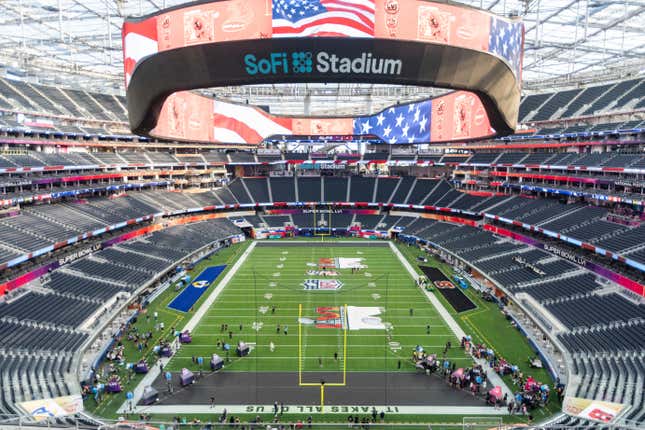
Way back in 2004, I flew from Boston to LA as a young reporter. My assignment was to check in with Black, Latinx and women business owners to find out how they made out four years earlier when their city hosted the 2000 Democratic National Convention.
Boston, where I was working at the time, was in line to host the 2004 DNC–the convention where a relatively unknown Barack Obama gave the speech that launched his rise to the presidency–and local officials were touting their plan to include small and diverse business owners in the economic bounty. I wanted to see for myself whether their promises held weight.
The answer, of course, was no and the same thing is likely to happen to businesses and neighborhoods in LA that have been promised a big windfall from hosting this weekend’s Super Bowl.
I spent the first decade of my journalism career mostly covering business and of the hundreds of economists I’ve interviewed, only the ones with their hands in local officials’ pockets buy into the notion that big, one-time events like the Super Bowl or big conventions are transformative, especially for Black communities. In fact they oven act as a drain: underserved communities and undercapitalized businesses grow when they get sustained investments over time. Super Bowls, on the other hand, suck up resources to pay for security and temporary improvements designed to make short-term visitors–who tend to be white and wealthy–comfortable until they leave.
And then there’s gentrification: rents in some cases in So-Fi Stadium, the multibillion-dollar complex built in the primarily Black and Latinx suburb of Inglewood have tripled since it opened last year. The Super Bowl won’t make it any better.
The city of 108,000 just outside Los Angeles has seen rent and home prices surge in recent years as Southern California has marked record housing prices. Corporate chains like Starbucks and the Habit have begun to dot the landscape, and local businesses are moving to the area from other white-dominant neighborhoods, including Jon & Vinny’s, a Los Angeles eatery popular with celebrities and known for its pizzas topped with caciocavallo and fior di latte cheeses. Concern over the city’s small, but growing white population was a recurring plot on the HBO show “Insecure,” which celebrated Black stories centered in Inglewood.
In 2021, the average home in Inglewood was going for about $744,000, according to Zillow, jumping 14.5% from 2020. Ten years ago, the typical home value was $266,000.
That doesn’t mean all of Inglewood hates the Super Bowl, though. Some local Black-owned businesses are encouraged, though still cautious about what’s happening around them.
Greg and Terry Dulan cannot wait for the Super Bowl.
They believe it will be a windfall for Inglewood and a boon to their small business, Dulan’s Soul Food Kitchen, which opened in 1999 and has been a beloved beacon in the city ever since.
There are many other business owners in Inglewood hoping for a boost from the thousands of people in their city for the big game. But when those temporary customers leave, it’s likely the regular Black and Brown people who’ll be left paying the Super Bill.

